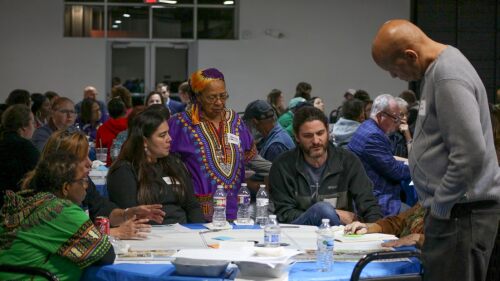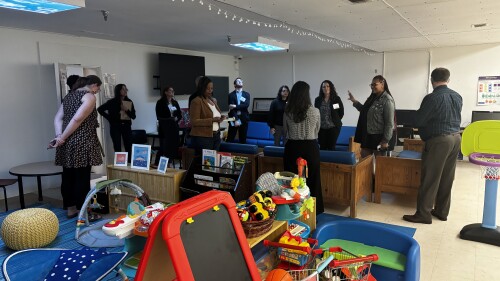ULI’s new online Foundations of Real Estate(FoRE) curriculum is targeted to undergraduate students at liberal arts colleges and universities. FoRE is a key part of the Institute’s efforts to identify, diversify, and broaden the pool of young people interested in a real estate career. The curriculum is offered through the ULI Learningprogram, which includes a variety of digital education courses as well as topical webinars provided to ULI members and prospective members.
FoRE was made possible with a generous gift to the ULI Foundation from Foundation Chairman Doug Abbey, who is also chairman of Swift Real Estate Partners in San Francisco. He cited three key benefits of the program:
- To provide liberal arts majors with exposure to real estate as a career option;
- To enable alumni to connect with students; and
- To increase diversity among real estate professionals.
The opportunity to create communities that are more diverse, equitable, and inclusive, through a real estate career, is a timely message and mission that can be delivered through FoRE, Abbey notes. ULI is committed to maximizing the role of philanthropy in affecting deep and meaningful change at a time in the Institute’s and the country’s history when issues like equitability and inclusiveness have emerged as necessary and game-changing concerns and considerations.
FoRE, which debuted at Colgate University during the 2019–2020 academic year, is designed to provide students not pursuing business studies with real estate fundamentals in an easily “digestible” format that is accessible, convenient, and that can be completed on an individually determined basis.
The curriculum consists of five modules:
- Foundations of the Development Process;
- Foundations of Pro Forma Modeling;
- Foundations of Commercial Real Estate (with a specific focus on multifamily and office sector valuation);
- Foundations of Real Estate Finance and Investment; and
- Introduction to the Foundations of Real Estate.
Upon completion of all the modules, participants receive a FoRE certificate confirming that they have finished the course successfully and have a basic understanding of the industry.
The program is being expanded to additional colleges and universities in the United States during the 2020–2021 academic year; ULI hopes to have the FoRE curriculum available at 100 institutions within five years. An emphasis will be placed on offering the program at historically Black colleges and universities (HBCUs), including four in 2020–2021. This is one part of ULI’s efforts to attract more people of color to the industry and the Institute.
According to ULI Global Chief Executive Officer W. Edward Walter, FoRE was created to help fill a void of undergraduate real estate courses at liberal arts institutions. “The goal of assembling this curriculum was to place interested and committed students in a position to learn enough so that when they enter the marketplace they can be competitive for an entry-level position, as opposed to starting from scratch. This benefits both the students and companies that hire them,” he says.
Introducing real estate to college students who likely would not otherwise be exposed to it so early helps expand participation beyond the traditional “family member–to–family member” entry into the business, Walter notes. “So often, the way people get into real estate is because one of their parents or relatives was in the business. FoRE gives us the opportunity to broaden the number and the diversity of people who might be interested in real estate and show them that it involves much more than merely selling properties, that they could pursue investment, development, or other aspects of the industry.”
The online curriculum can be accompanied by in-person training from real estate executives, ideally ULI members, who are alumni of FoRE’s higher education institution partners and are supplementing the program with their own content, knowledge, and industry experiences, which exemplifies the Institute’s longstanding tradition of knowledge sharing, Walter says. “Alumni adding context to the courses makes the curriculum more interesting for the students, and it provides a mentoring component. Also, from the school’s perspective, having them [alumni] participate helps to strengthen the bond between the school and the alumni.”
Kurt Wright, chairman and chief executive officer of Quadrant Real Estate Advisors in Alpharetta, Georgia, was among the Colgate alumni who served as a student mentor during FoRE’s first year at the university. “The program is an extremely efficient mechanism for teaching students critical, foundational concepts, analytical tools, and the language of real estate that they will use on the first day on their jobs and throughout their entire careers,” Wright says. He credited the success of the program to the commitment of the career services team in getting students interested in real estate as a career choice; an active real estate club (atypical for a liberal arts institution); and a large, international group of alumni who are actively involved in offering career guidance to the students.
“This program is a way for a math major, economics major, or an English major to supplement their studies with an effective vocation-oriented program that does not interfere with their classroom work or extracurricular activities,” Wright says. “Pursuing real estate is not a career-narrowing decision; it is a career-expanding decision. For anyone who is contemplating moving from a liberal arts degree to something related to real estate—such as engineering, architecture, urban planning, or law—this program provides a better understanding of that specific field. For instance, someone who decides to go to law school might decide to focus on real estate law after completing the FoRE curriculum. FoRE allows students the opportunity to expand their career choices and broaden their knowledge about careers in a very portable way.”
The introduction of FoRE at Colgate University allowed the institution to provide a far more structured process for students to learn about real estate, explained Teresa Olsen, assistant vice president for career initiatives at Colgate. “The world of real estate is so vast, and this was a fantastic opportunity for us to offer a guided process for students to learn about all that it entails. We were impressed with the quality of the content and the robust, holistic thinking within ULI. FoRE is perfect for students who are looking at tackling problems in a cross-disciplinary or cross-functional way, who are considering how they can take the liberal arts component of their education, put it to work, and have a forward-facing, fulfilling career.”
More than 100 students pursuing studies as varied as economics, sociology, geography, psychology, humanities, and political science signed up for FoRE during the fall 2019 semester. While many initially approached the experience with the assumption that real estate is about “putting up a building and then being done,” they learned that it involves “creating a community and thinking about the ethical and social impacts of what you will create,” Olsen says. “Our students were surprised to learn that real estate could be an arena in which one can address social issues or sustainability challenges or find a ‘green’ career. There will always be students who are into brokerage and investments, and those are excellent careers, but we were also excited to help students conceptualize a different career path involving real estate, to see real estate as a way to connect all their other professional ambitions.”
The online format for the FoRE curriculum was particularly suited to the virtual learning environment necessitated by the COVID-19 pandemic and the cancellation of in-person classes during the spring 2020 semester, she notes. Colgate is planning to offer the curriculum during the upcoming academic year.
FoRE’s curriculum provides a way to “connect to a generation that recognizes that we should be seeking a more just and equitable society with more opportunities for people who live in disadvantaged communities,” Abbey says. “An important way to tackle inequities—and it is a long game—is to change how communities are planned and built, and to expand access to affordable housing, transportation, infrastructure, parks, all the things that make better living environments. We shape our cities and our cities shape us. And through this program, we can tap into that desire that young people have to create a better, more equitable world by helping them understand how land use policies and decisions are made and how they affect our communities, in terms of diversity and quality of life. We can help students understand that through real estate, they can help shape society by creating communities that match their values.”
ULI Foundation board member Faron Hill points to the ULI Learning platform, and specifically FoRE, as one of several tools that the Institute offers to support diversity and inclusion efforts in education and land use. “There is a great deal of work that has to take place in the industry on issues such as social equity and inclusivity. That is something we all agree on. However, this effort will be a marathon and not a sprint,” says Hill, president of Peregrine Oak LLC in Peachtree Corners, Georgia.
“In the absence of close relationships, it can be challenging for new entrants and existing participants to gain valuable experience or access the requisite tools to build their careers while having a support system,” Hill notes. “This platform offers entry-level and advanced knowledge of the fundamentals and broader concepts. The instructors are industry practitioners and thought leaders. The content is well planned and based on real-world examples. In addition, FoRE also provides a foundation for a support system that can be grown over time.
“Participants have the opportunity to network and develop relationships for the future,” Hill says. “Each point of contact provides a future source for daily problem-solving and new business opportunities. For minority college students, it can catalyze thinking about the possibility of owning the building versus trying to find a job in the building, while introducing other professional options.”
The best way to build more just and equitable communities is to create an industry as diverse as the communities themselves. Through FoRE, the Institute endeavors to make real estate more accessible and to eliminate barriers to entry into the field. To learn more about ULI Learning and the range of courses offered, visit https://learning.uli.org.




